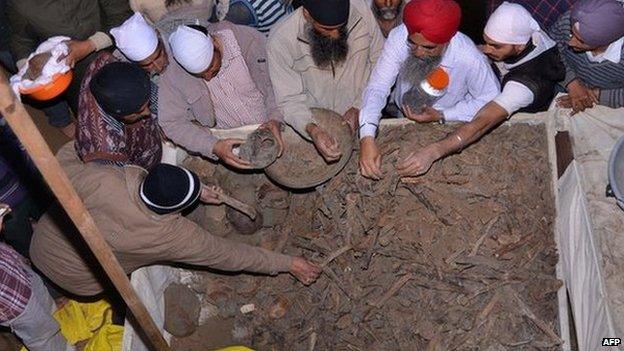India to examine claims over '1857 rebel' bodies
- Published

Local people have demanded a memorial for the remains
Archaeologists in India are examining claims that remains of people dug up from a disused well in the northern state of Punjab belong to soldiers who revolted against the British in 1857.
A Sikh temple said villagers in Ajnala had exhumed the remains of 282 soldiers who were executed by the British.
But historians and archaeologists say it is too early to come to that conclusion.
In India the mutiny is often described as the first war of independence.
Hindu and Muslim soldiers rebelled against the British East India Company in 1857 over fears that gun cartridges were greased with animal fat forbidden by their religions.
The British ruled India for 200 years until the country's independence in 1947.
Amarjit Singh Sarkaria, the chief of a local gurdwara (Sikh temple) in Ajnala in Amritsar district, told reporters, external that villagers had excavated a well that was located in the shrine and recovered the remains of 282 mutineers. The remains included skulls, teeth and coins, he said.
Archaeologists have reached the shrine and are examining the remains, Navjot Singh Randhawa, chief of Punjab's archaeological department, told the BBC.
Memorial demand
He said "40 to 50" human skulls had been found in the excavated well, along with skeletons, coins and medals "that seem to date back to the Victorian period".
It is not clear whether experts will rely on radio carbon dating to assess the remains.
Mr Randhawa, however, said there was still "no evidence" to link the remains to those of Indian soldiers who died in the 1857 mutiny.
"What we have evidence of is that 282 soldiers who revolted [against the British in 1857] were imprisoned in Ajnala. We have no evidence about what happened to these soldiers. There is absolutely no evidence that they were thrown into a well," he said.
Mr Randhawa said the remains in the well could even belong to "people who jumped into wells and died" during the religious killings which marked India's bloody partition in 1947.
Senior Ajnala official Surinder Singh told BBC Hindi that police had been deployed around the Sikh shrine where the remains had been kept and local demands for a "proper funeral and a memorial" had been sent to the government.
"I have seen several skeletons and coins at the site. But we cannot confirm that they date back to 1857," he said.
Punjab government records, external of the 1857 mutiny quoting historical texts say 282 soldiers belonging to the 26th Native Infantry Regiment stationed near Lahore escaped after killing two British officers and were intercepted in Ajnala in 1857.
The rebels were imprisoned in the local police station and government barracks and later many of them were shot and dumped into a local well which was then "ordered to be filled with charcoal and lime and a high mound of earth was raised over it", the records say.